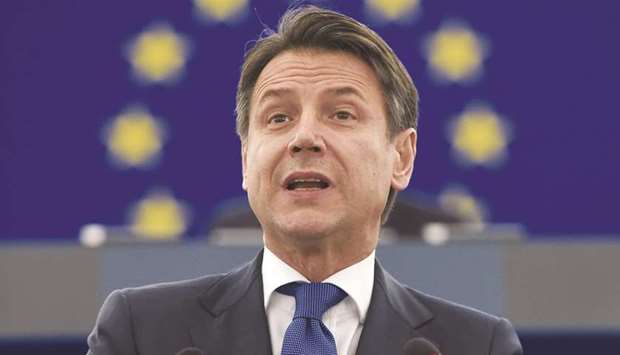Reuters/Strasbourg
Italian Prime Minister Giuseppe Conte has called for a less austere European Union more in tune with popular demands for economic growth, but he faced a barrage of criticism after his keynote speech in the EU legislature.
Speaking to the European Parliament in Strasbourg as part of a series of contributions by national leaders to a debate on the future of the Union, Conte stressed the continued commitment of Rome’s populist government to EU integration – a commitment some doubted after the coalition’s election last year.
However, in renewing Italian calls for more flexibility in eurozone budget rules, common debt instruments for the EU currency area, an EU unemployment fund and a change in rules intended to avoid new bank collapses, he said that years of austerity had driven a wedge between elites and people that endangered the Union.
“The powerful opposition that the European people, in its various forms, is demonstrating in the face of the elites speaks to our consciences and reminds us that politics, too assertive on economic rationales, has not done its homework and has given up on its mission,” Conte told the assembled lawmakers.
Insisting that his administration is keeping its “accounts in order”, Conte said it is also seeking to stimulate growth.
He called for the EU to end long arguments over how to handle migrants arriving by sea across the Mediterranean – a longstanding Italian complaint – and to play a stronger, more united role in global affairs while maintaining dialogue with other powers such as the United States, Russia and China.
However, leaders of mainstream political groups, whose Italian allies found themselves excluded from power in Rome by the rise of the populist League and 5-Star Movement (M5S) coalition, lined up to criticise Conte’s government.
They objected to Rome’s straying from eurozone budget rules, passing measures against asylum-seekers, or siding with Russia to thwart EU support for the opposition in Venezuela.
The sharp exchanges with a prime minister who, as an academic and political novice, is seen as the moderate face of a government dominated by radical voices, illustrated themes that will be aired in elections to the EU assembly this coming May.
While Conte himself rejected charges from the floor that he was a mere “puppet” of the League and M5S, his far-right Interior Minister Matteo Salvini, leader of the League, also leapt to his defence.
He called it “shameful” that “European bureaucrats” had “insulted” not just the premier but all Italy.
“The European elites (are) against the choices of the peoples,” Salvini said in a statement. “Prepare the crates. On May 26, the people will finally send these folks packing.”
After weeks of tension with France after senior figures in his government hailed protesters opposed to President Emmanuel Macron, Conte offered a veiled rebuff to French complaints, which culminated in recalling the French envoy from Rome.
“We should not be afraid of conflict. We should show that we can control it,” Conte said. “We should not oppose change with sterile and damaging conservatism. Instead, we should allow conflict to emerge, to demonstrate – in democratic forms – its propulsive force.”
On a day when Rome also irritated Paris by questioning the need for a new Alpine rail link, Conte appeared to tweak French interests by calling for a combined EU permanent seat on the UN Security Council.
Barring soon-to-be ex-EU member Britain, France is the bloc’s lone voice on the global body.
Over nearly three hours of debate, tempers flared at times.
Anti-EU members spoke in Conte’s defence and the chamber’s speaker had to ask his fellow Italians to mind their language.
Manfred Weber, German leader of the main conservative bloc in the European Parliament, accused Conte of running an economic policy based on high borrowing and slow growth.
Socialist leader Udo Bullmann accused Rome of showing “the ugly face of inhumanity” toward-asylum seekers landing on Italy’s shores.
Speaking Italian, former Belgian prime minister Guy Verhofstadt, the liberal leader, said that his “love for Italy”, a founding member of the EU, made it “painful” for him to see what he called the country’s “political disintegration” that began with the administrations of conservative Silvio Berlusconi.



